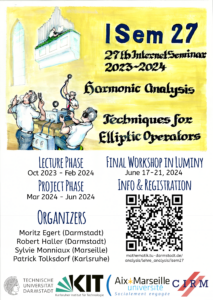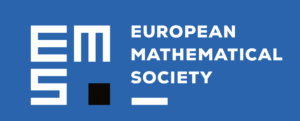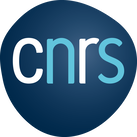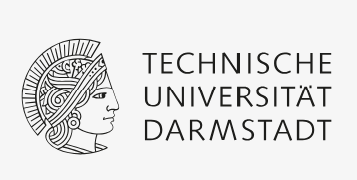Scientific Committee
Comité scientifique
Wolfgang Arendt (University of Ulm)
Alessandra Lunardi (University of Parma)
Abdelaziz Rhandi (University of Salerno)
Organizing Committee
Comité d’organisation
Moritz Egert (Technical University of Darmstadt)
Robert Haller (Technical University of Darmstadt)
Sylvie Monniaux (Aix-Marseille Université)
Patrick Tolksdorf (Karlsruhe Institute for Technology)
This research school focuses on cutting-edge techniques in harmonic analysis and their applications to differential operators with rough coefficients. It will be the 27th edition of the internationally recognized series International Internet Seminar on Evolution Equations.
The famous Kato problem and its solution at the beginning of the 2000s has initiated a number of developments in the interplay of at least three mathematical fields – harmonic analysis, elliptic PDEs, functional calculus – leading to a surge of spectacular new results over the last two decades. A key idea behind most of the developments can roughly be described as replacing the Laplace operator, that plays a fundamental role in each of the three fields, by a more general differential operator with rough coefficients. The new analytic concepts that emerged from pursuing this program have become a basis for modern research in analysis.
With the proposed research school we aim to pass these techniques and tools over to the next generation of mathematicians.
The research school aims to
• encourage young, promising scientists to get deeply involved into the field,
• provide a platform to young scientists in a creative and benevolent atmosphere,
• foster an intense dialogue and cooperation between young scientists and leading experts,
• bring together experts from different directions within the broader field of evolution equations and spread the topic in our community.
The International Internet Seminar on Evolution Equations is a series of seminars that first took place in 1997/98. For participating junior scientists the proposed research school is the culmination of eight months of intense acitivity around the topic.
Dans cette école de recherche, on se concentrera sur les techniques fines en analyse harmonique et ses applications aux opérateurs différentiels à coefficients non réguliers. Ce sera la 27ème édition de la série reconnue internationalement de l’International Internet Seminar on Evolution Equations.
Le célèbre problème de Kato et sa solution au début des années 2000 ont été à l’origine d’un grand nombre de développements à l’intersection d’au moins trois domaines des mathématiques – l’analyse harmonique, les équations aux dérivées partielles elliptiques, le calcul fonctionnel – qui ont donnés de nouveaux résultats spectaculaires pendant les deux dernières décennies. Une idée clé dans la plupart des développements peut se résumer grossièrement par le remplacement de l’opérateur Laplacien, qui joue un rôle majeur dans chacun des trois domaines cités plus haut, par un opérateur différentiel à coefficients non réguliers plus général. Les nouveaux concepts d’analyse qui ont émergé sont devenus la base de la recherche moderne en analyse.
Avec cette école de recherche, nous avons l’ambition de passer ces techniques et outils à la nouvelle génération de mathématiciens et mathématiciennes.
Cette école de recherche a pour but:
• d’encourager de jeunes scientifiques prometteurs de s’intéresser à ce domaine de recherche,
• de fournir une plateforme aux jeunes scientifiques dans une atmosphère créative et bienveillante,
• de favoriser un dialogue et une coopération intense entre les jeunes chercheurs.euses et les experts du domaine,
• de réunir des experts de différentes directions dans le domaine plus large des équations d’évolution et d’essaimer le sujet dans notre communauté.
L’International Internet Seminar on Evolution Equations est une série de séminaires qui a eu lieu pour la première fois en 1997/98. Pour les jeunes participants, cette école de recherche est le point culminant de huit mois d’activité intense autour de ce sujet.
LECTURES
Pascal Auscher (Université Paris-Saclay) Weak solutions of abstract parabolic problems
Dorothee Frey (Karlsruhe Institute of Technology) Paradifferential methods for elliptic operators
SPEAKERS
Project blue : Julian Hölz and Jonathan Mum (coordinators) and Ivan Puljiz, Sefika Kuzgun, Siliang Weng, Paul Czerny (participants/speakers)
Project brown : Marjeta Kramar-Fijavz and Ivica Nakic (coordinators) and Thomas Adrian, Giulio Pecorella, Fabian Merz, Jakob Paulo Witt (participants/speakers)
Project cyan : Emiel Lorist (coordinator) et Johannes Stojanow, Himani Sharma, Andrew Pritchard (participants/speakers)
Project gray : Amru Hussein (coordinator) and Bernhard Aigner, El Assad Ouro-Koura, Simon Bau, Simon Murmann (participants/speakers)
Project green : René Hosfeld et Merlin Schmitz (coordinators) and Chiara Alessi, Stefano Böhmer, Rafael Hirsch, Pablo Merino San José (participants/speakers)
Project lime : Peer Kunstmann (coordinator) and Khalid Baadi, Jen de Vries, Paul Beckermann, Abdelhakim Dahmani (participants/speakers)
Project magenta : Andrea Carbonaro and Oliver Dragicevic (coordinators) and Floris Roodenburg, Bruno Predojevic, Arnaud Dumont, Nikita Cernomazov (participants/speakers)
Project olive : Jonas Sauer (coordinator) and Paul Stephan, Leon Berghoff-Flüel, Philip Preussler (participants/speakers) and Sara Mountassir (online)
Project orange : Wolfgang Arendt and Manuel Schlierf (coordinators) and Azam Jahandideh, Vinzenzo Leone, Henning Heister (participants/speakers)
Project pink : Sebastian Bechtel (coordinator) and Tolgahan Tasci, Mattes Wittig, Timotheus Schmaltzer, Cody Michael Hutcheson (participants/speakers)
Project purple : Hendrik Vogt (coordinator) and Erik Heidrich, Charlotte Söder, Siguang Qi, Jonas Lenz (participants/speakers)
Project red : Katharina Klioba and Sascha Trostorff (coordinators) and Maximilian Ruff, Drech Vusconty Miassangana, Francisco Carvalho (participants/speakers)
Project teal : Tim Böhnlein and Andrew Morris (coordinators) and Tobias Wang, Luca Haardt, Wilhelm Treschow, Pablo Hidalgo-Palencia (participants/speakers)
Project violet : Simon Bortz (coordinators) and Alessandra Migliaccio, Sven Lauterbach, Dann van Dijk (participants/speakers)
Project yellow : Sahiba Aurora (coordinator) and Christoph Schwerdt, Ilka Wöckel, Guillaume Neuntens, Salah-Eddine Chorfi (participants/speakers)







